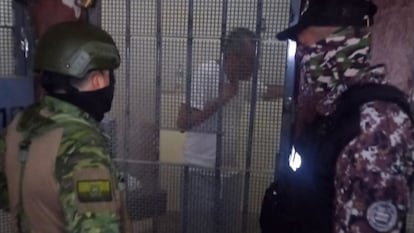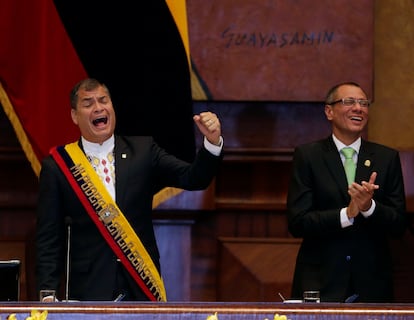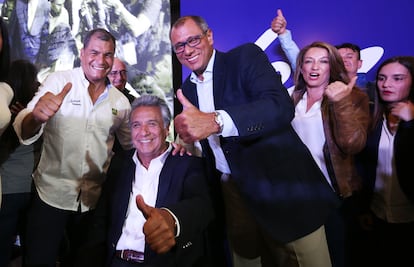Jorge Glas, the faithful shadow of Rafael Correa
The former Ecuadorian vice-president, arrested after the police raid on the Mexican Embassy in Quito, has pursued his career in parallel with the ex-president in foreign exile

An aging man, restrained in shackles and sitting in the back of a police van, is a far cry from the clean-cut, successful and powerful gentleman who ran Ecuador for more than a decade, between 2007 and 2018, in the shadow of the charismatic and captivating Rafael Correa. His life in the last year has swung back and forth like a pendulum between the possibility of returning to the upper echelons of power or ending up in a maximum-security prison, surrounded by gang bosses. For now, the latter is his destiny. Luck has not favored him, although it almost did. This week, Mexico deemed him a politically persecuted individual and granted him asylum status, allowing him to seek refuge in the country from the three corruption cases for which he is being prosecuted in Ecuador. However, in an unprecedented step, the Ecuadorian president, Daniel Noboa, ordered the storming of the Mexican embassy in Quito and the immediate arrest of Glas.
The image of defeat now hangs over him like a black cloud. In April 2022, when he was released from prison for the first time after serving 1,645 days, he appeared refreshed and with a different look: an earring in his ear, his hair combed back, wearing a navy-blue suit and glasses. Correa followers were waiting for him at the gate waving flags and wearing T-shirts with his face printed on them. The judge granted him pre-release on health grounds. This did not prevent the former vice-president from returning to the public domain. Correa contemplated his candidacy for the 2023 presidential elections, a risky move that eventually did not materialize because they thought that the Ecuadorian justice system would ultimately invalidate him. Instead, his purpose was to remain in the background, just like when he served Correa and was in charge of petroleum, the main source of financing and which brought prosperity to the country during that period.

Glas has garnered a reputation among his supporters as a loyal man who sticks to his guns. He did not take any of the deals offered to him by the Prosecutor’s Office in exchange for snitching on his party colleagues or Correa, the real big fish the authorities were chasing. Glas and Correa believe they are being persecuted by their opponents, who are now in power. The two were planning to reclaim the government in 2023 and help each other through intermediaries to remedy the judicial situation, but a deep security crisis gave the advantage to Noboa, a candidate who rose from obscurity and now governs with an iron fist. Glas has remained silent all this time and he may be considered anything but a traitor.
The politician hails from the middle class of Guayaquil. Born on September 13, 1969, he is the eldest of three children of a family that was abandoned by his father when he was a child. Despite economic difficulties, he managed to complete his studies to graduate as an electrical engineer, although he really wanted to be a doctor. He was educated in a Salesian religious school and participated in the boy scouts group, where he first met Rafael Correa, who was his pack leader. Besides having similar interests, the two also bonded because of their troubled relationships with their fathers. Coincidentally, both their mothers are called Norma.

Correa went abroad to study and Glas abandoned his dream of becoming a physician to get a job and help out at home — they always remained in contact. Glas became an interviewer for a television program on a small local channel owned by his uncle, Ricardo Rivera, who was also indicted on corruption charges for having received fraudulent government contracts while his nephew was in power. Correa was one of his recurring guests on the talk show. According to Glas, from that moment on they began to “fight together for certain issues.”
When Correa became president, he called his old friend to ask his opinion on an issue regarding telecommunications and the Fondo de Solidaridad (Solidarity Fund), an institution independent of any ministry. This served as a savings fund for emergencies such as natural disasters and contingencies. It was fed by the country’s oil surpluses. Glas’s recommendation was to close this “corruption den of all governments.”
Correa appointed Glas as director of the fund with the objective of winding it up. From there his rise to the top began, until he became the senior minister overseeing all strategic state-owned companies. He was responsible for public policy on oil resources, mines, electricity, telecommunications and water, and was the president’s right-hand man, chosen as his running mate in his last term. In 2016, Correa appointed him as head of reconstruction projects in two provinces affected by a 7.8 earthquake that claimed more than 600 lives. Glas had to administer close to $3 billion obtained through a temporary increase in taxes on Ecuadorians, donations and loans. This was in the midst of an economic crisis that was undermining the president’s popularity.
Regarding this case, known as Reconstruction, a judge issued an arrest warrant against Glas for the alleged crime of embezzlement. The former vice president claims that this is an unfounded accusation and the politician fled to a territory that he believed to be safe. But it did not turn out to be so.
Follow all the information from El PAÍS América on Facebook and X, or in our weekly newsletter.
Tu suscripción se está usando en otro dispositivo
¿Quieres añadir otro usuario a tu suscripción?
Si continúas leyendo en este dispositivo, no se podrá leer en el otro.
FlechaTu suscripción se está usando en otro dispositivo y solo puedes acceder a EL PAÍS desde un dispositivo a la vez.
Si quieres compartir tu cuenta, cambia tu suscripción a la modalidad Premium, así podrás añadir otro usuario. Cada uno accederá con su propia cuenta de email, lo que os permitirá personalizar vuestra experiencia en EL PAÍS.
¿Tienes una suscripción de empresa? Accede aquí para contratar más cuentas.
En el caso de no saber quién está usando tu cuenta, te recomendamos cambiar tu contraseña aquí.
Si decides continuar compartiendo tu cuenta, este mensaje se mostrará en tu dispositivo y en el de la otra persona que está usando tu cuenta de forma indefinida, afectando a tu experiencia de lectura. Puedes consultar aquí los términos y condiciones de la suscripción digital.








































